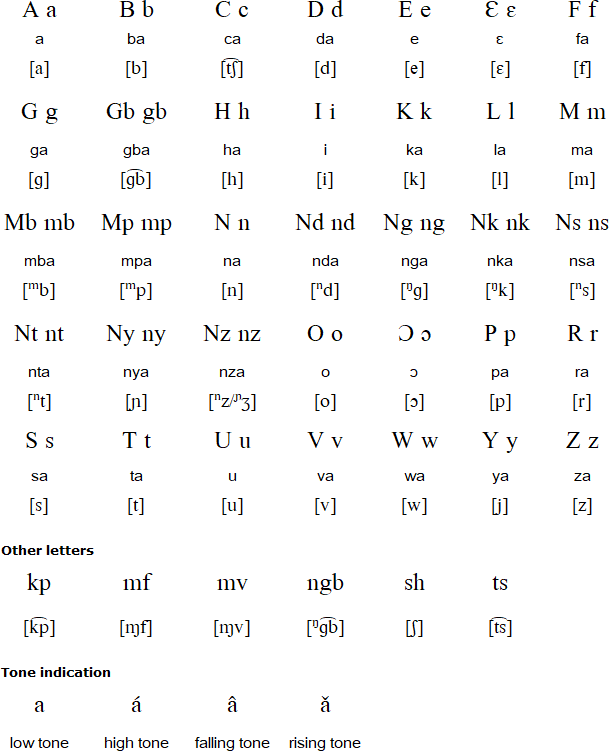Lingala is a Bantu lanuage spoken mainly in the Democratic Republic of Congo (DRC) and in the Republic of Congo, and also in Angola and the Central African Republic. There are thought to be 5.5 million native Lingala speakers, and 7 million second language speakers in the DRC. The number in the Republic of Congo is not known.
The Lingala of today is based on Bangi (Bobangi), a language that was spoken along the Congo River between Lisala and Kinshasa, and which is still spoken in parts of the DRC and the Republic of Congo. Bangi was the regional trade language until the arrival of the Europeans in the late nineteenth century. After the Europeans arrived, Bangi became the lingua franca for the region and was used in administration and by missionaries. Over time it became simplified, borrowed words from other languages, and started to be used in most domains. This version of the language became known as Lingala.
Lingala language can be divided into four variations: Standard Lingala, Spoken Lingala, Kinshasa Lingala, and Brazzaville Lingala.
Standard Lingala is mostly used in educational and news broadcasts on radio or television, in religious services in the Catholic Church and is the language taught as a subject at all educational levels. Standard Lingala is historically associated with the work of the Catholic Church and its missionaries. It is largely used in formal functions.
Spoken Lingala is the variation mostly used in the day-to-day lives of Lingala speakers. This variation of Lingala is historically associated with the work of Protestant missionaries. Spoken Lingala is largely used in informal functions, and the majority of Lingala songs use Spoken Lingala. Modern Congolese music, called soukous, is one of the most popular in Africa and is a true source of enrichment of the language.
Kinshasa Lingala and Brazzaville Lingala are the dialects from the capitals of both Congos. They are both heavily influenced by other Bantu languages as well as French (the official language of both countries). They both have many borrowed words from those languages, as well as a simplified phonology and grammar.
See a version of this text in Lingala
Information supplied by http://dictyon.net
Lingala was first written by missionaries in about 1900. Today there are various ways to write it, all of which use the Latin alphabet. There is no standard spelling system and literacy in Lingala is low among Lingala speakers.

Tone indication appears to be optional.
Download an alphabet chart for Lingala (Excel)
Details of the Lingala alphabet provided by Michael Peter Füstumum
Bato nyonso na mbotama bazali nzomi pe bakokani na limemya pe makoki. Bazali na mayele pe base, geli kofanda na bondeko okati na bango.
All human beings are born free and equal in dignity and rights. They are endowed with reason and conscience and should act towards one another in a spirit of brotherhood.
(Article 1 of the Universal Declaration of Human Rights)
Information about Lingala | Phrases | Numbers
Information about the Lingala language
http://en.wikipedia.org/wiki/Lingala_language
Information about Lingala, including listening comprehension materials and Lingala-English crossword puzzles
http://dictyon.net/lingalamaterials.html
Online Lingala lessons
https://www.livelingua.com/project/fsi/Lingala/
https://www.youtube.com/user/gargantuanstudios
http://www.memrise.com/courses/english/lingala/
Aka, Aushi, Bafaw-Balong, Bangi, Bangubangu, Basaa, Bemba, Bembe, Bena, Benga, Bhaca, Bila, Bube, Budu, Bujeba, Bukusu, Bulu, Bushong, Central Kilimanjaro, Central Teke, Chichewa, Chokwe, Chuwabu, Comorian, Dciriku, Digo, Duala, Eton, Ewondo, Fang, Fuliiru, Ganda/Luganda, Gogo, Gusii, Gwere, Gyele, Haya, Hehe, Herero, Ibinda, Idaxo-Isuxa-Tiriki, Ikizu, Ikoma, Jita, Kabwa, Kako, Kamba, Kanyok, Kiga, Kikuyu, Kimbundu, Kinyarwanda, Kirundi, Kisi, Kobo, Kogo, Komo, Kongo, Konjo, Koti, Kukuya, Kunda, Kuria, Kwambi, Kwasio, Lambya, Lengola, Lingala, Loma, Lozi, Luba-Katanga, Luchazi, Lunda, Luvale, Luyana, Makaa, Makonde, Makhuwa, Mandekan, Maore, Masaaba, Mbama, Mbere, Mbosi, Mbukushu, Mbunda, Mbuun, Mende, Mongo, Mpiemo, Mushungulu, Mwani, Myene, Nambya, Nande, Ngoni, Ngwii, Njebi, Nkore, North Teke, Northern Ndebele (South Africa), Northern Ndebele (Zimbabwe), Northern Sotho, Nyamwezi, Nyakyusa, Nyemba, Nyole, Nyoro, Nyungwe, Nzadi, Oroko, OshiWambo, Pagibete, Punu, Ronga, Safwa, Seki, Sena, Sengele, Shona, Soga, Songe, Southern Ndebele, Southern Sotho, Suba, Sukuma, Swahili, Swati, Taita, Talinga, Tanga, Tembo, Tetela, Tonga, Tooro, Tshiluba, Tsonga, Tswa, Tswana, Tumbuka, Umbundu, Venda, Vili, Vwanji, West Teke, Xhosa, Yakam, Yansi, Yao, Yasa, Yeyi, Zigula, Zinza, Zulu
Languages written with the Latin alphabet
Page last modified: 09.06.24
[top]
You can support this site by Buying Me A Coffee, and if you like what you see on this page, you can use the buttons below to share it with people you know.

If you like this site and find it useful, you can support it by making a donation via PayPal or Patreon, or by contributing in other ways. Omniglot is how I make my living.
Note: all links on this site to Amazon.com, Amazon.co.uk
and Amazon.fr
are affiliate links. This means I earn a commission if you click on any of them and buy something. So by clicking on these links you can help to support this site.
[top]